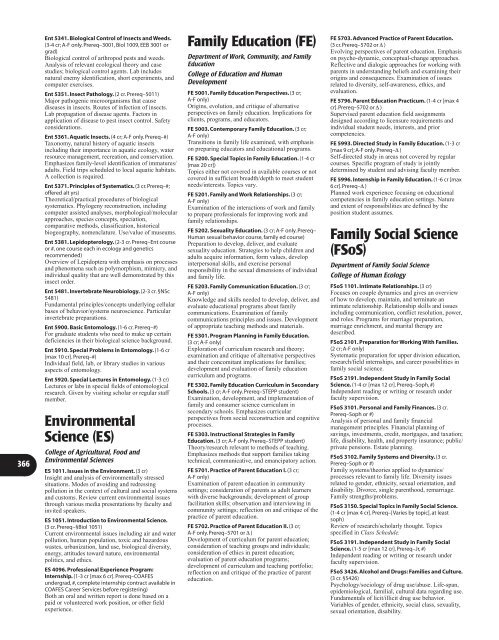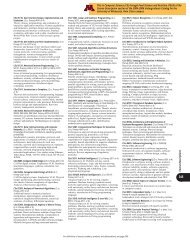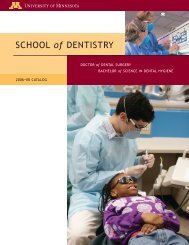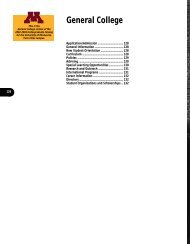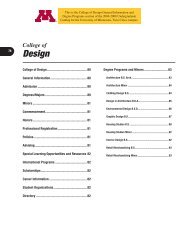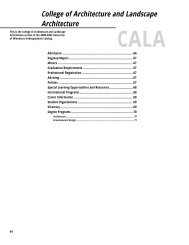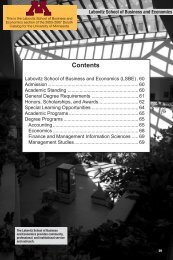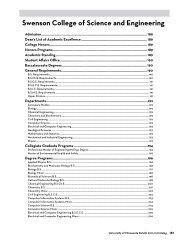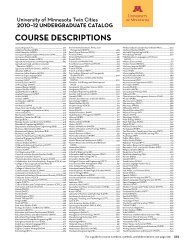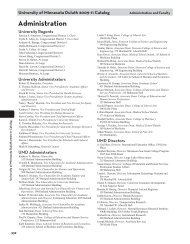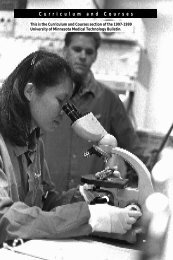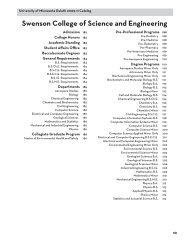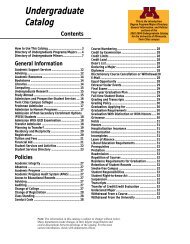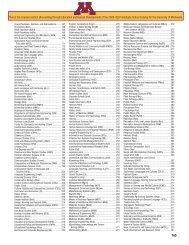EngC 1014. University Writing <strong>and</strong> Critical Reading:Contemporary Public Issues. (4 cr. §1011, §1012,§1013, §1015, §1014H, §GC 1422, §GC 1423, §GC 1424.Prereq–Some sections limited to ESL)Writing on topics concerning citizenship <strong>and</strong> publicethics. Projects involve critical reading/interpretationof selected texts, research in various types ofresources, <strong>and</strong> writing <strong>through</strong> several drafting steps.Finished writing is revised/edited to meet universitylevelst<strong>and</strong>ards.EngC 1014H. University Writing <strong>and</strong> CriticalReading: Contemporary Public Issues. (4 cr. §1011,§1012, §1013, §1014, §1015, §GC 1422, §GC 1423, §GC1424. Prereq–Honors)Writing on topics concerning citizenship, publicethics. Critical reading/interpretation of texts,research in various resources, writing <strong>through</strong> severaldrafting steps. Finished writing is revised/edited tomeet university-level st<strong>and</strong>ards of persuasiveness,precision, <strong>and</strong> correctness.EngC 1015. University Writing <strong>and</strong> Critical Reading:Perspectives on Globalization. (4 cr. §1011, §1012,§1013, §1014, §GC 1422, §GC 1423, §GC 1424.Prereq–Placement in category 2 or 3; some sectionslimited to ESL)Critical reading/interpretation of selected texts.Research in various types of resources, includingInternet. Writing <strong>through</strong> several drafting steps.Finished writing is revised/edited to meet universitylevelst<strong>and</strong>ards of persuasiveness, precision, <strong>and</strong>correctness.EngC 1021. Intermediate Expository Writing. (4 cr.Prereq–1011 or 1012 or 1013 or 1014)Focuses on the range of choices writers make basedon audience, purpose, <strong>and</strong> context. Relies on criticalreading <strong>and</strong> a variety of writing assignments toimprove control over writing <strong>and</strong> the effect it willhave on intended audiences.EngC 1021W. Intermediate Expository Writing. (4 cr.Prereq–1011 or 1012 or 1013 or 1014)Focuses on the range of choices writers make basedon audience, purpose, <strong>and</strong> context. Relies on criticalreading <strong>and</strong> a variety of writing assignments toimprove control over writing <strong>and</strong> the effect it willhave on intended audiences.EngC 1601W. English Language <strong>and</strong> Society. (4 cr)Provides a general, non-technical underst<strong>and</strong>ing ofthe systematic, dynamic <strong>and</strong> creative nature ofhuman language, with special application to theEnglish language.EngC 3027W. Advanced Expository Writing. (4 cr.Prereq–Completion of freshman writing requirement)Incorporating narrative, descriptive, analytical,persuasive techniques into writing on general topics.Effective argumentation <strong>through</strong> critical reading, useof library resources, awareness of context/audience.EngC 3603W. World Englishes. (3 cr)Historical background, psychosocial significance,<strong>and</strong> linguistic characteristics of diverging varieties ofEnglish spoken around the world, especially inpostcolonial contexts (Caribbean, Africa, Asia).Development of local st<strong>and</strong>ards/vernaculars.Sociolinguistic methods of analysis.EngC 3605W. Social Variation in American English.(4 cr)Description <strong>and</strong> analysis of English languagevariation from a sociohistorical perspective in theUnited States <strong>and</strong> the Caribbean. Social history ofmigrations (voluntary <strong>and</strong> enforced) leading to thedevelopment of regional <strong>and</strong> rural dialects, pidgins,creoles <strong>and</strong> urban varieties.EngC 3606. Literacy <strong>and</strong> American CulturalDiversity. (4 cr)Academic study of the nature, acquisition,institutionalization, <strong>and</strong> present state of literacy inthe United States. Special focus on issues ofculturally diverse <strong>and</strong> disadvantaged members ofsociety. Service-learning component requirestutoring (min. 2 hours per week) of children <strong>and</strong>adults in community service agencies.EngC 3621W. Writing Beyond the Academy. (4 cr.Prereq–Completion of freshman writing requirement,60 cr)Analyses of writing styles, genres, <strong>and</strong> rhetoricalcontexts outside the academy in a semester-longinternship. Students must have an approved sitearranged by the OSLO office <strong>and</strong> the Director ofUndergraduate Studies of the English Department.EngC 3650. Topics in Rhetoric, Composition, <strong>and</strong>Language. (3 cr)Topics specified in Class Schedule.EngC 5051. Graduate Research Writing Practice forNon-native Speakers of English. (3 cr. Prereq–Gradstudent)Graduate-level writing techniques/formats for summaries,critiques, research, <strong>and</strong> abstracts. Persuasion,documentation, structure, grammar, vocabulary, fieldspecificrequirements. Writing <strong>through</strong> several drafts,using mentor in specific field of study. Revising/editing to meet graduate st<strong>and</strong>ards. Discussions.EngC 5690. Minnesota Writing Project: DirectedStudies. (1-3 cr [max 30 cr])Workshops in which writing teachers investigatecurrent theories of writing <strong>and</strong> writing pedagogy,write for publication, <strong>and</strong> explore research topics inapplied literacy.Entomology (Ent)Department of EntomologyCollege of Agricultural, Food <strong>and</strong>Environmental SciencesEnt 3001. Insects <strong>and</strong> Insect Management. (1 cr.Prereq–Biol 1009 or equiv)Principal orders of insects/arachnids. Introduction tostructure, physiology, population dynamics, <strong>and</strong>management. Lecture/lab. Meets in weeks 1-4.Ent 3005. Insect Biology. (3 cr)Survey of diversity/biology of insects. Insectbehavior (including social insects), pollination,herbivory, insects as disease vectors, beneficialinsects, insect population dynamics/ecology.Emphasizes insects’ role in agricultural, urban,natural systems. Lecture/lab. Required Saturday fieldtrip on second weekend of semester.Ent 4005. Economic Entomology. (3 cr; A-F only)Management of insect populations. Life histories.Habits/recognition of insect pests of field/vegetablecrops. Lecture/lab.Ent 4015. Ornamentals <strong>and</strong> Turf Entomolgy. (3 cr.Prereq–1xxx <strong>course</strong> in biol or hort or forest resources)Diagnosis <strong>and</strong> management of insect pests inl<strong>and</strong>scape plants. Emphasis on the principles ofbiological control, biorational pesticides, <strong>and</strong>integrated pest management.Ent 4021. Honey Bees <strong>and</strong> Insect Societies. (3 cr.Prereq–Biol 1009 or #)Natural history, identification, <strong>and</strong> behavior of honeybees <strong>and</strong> other social insects. Evolution of socialbehavior, pheromones <strong>and</strong> communication,organization <strong>and</strong> division of labor, social parasitism.Lab with honey bee management <strong>and</strong> maintenance ofother social bees for pollination.Ent 4022. Honey Bee Management. (1 cr.Prereq–4021 recommended, Biol 1009 or #)Field <strong>course</strong> for students interested in honey beemanagement <strong>and</strong> the conservation <strong>and</strong> maintenanceof other bee pollinators. Work with live bee colonies<strong>and</strong> participate in field research problems related tohoney bee behavior <strong>and</strong> management.Ent 4096. Professional Experience Program:Internship. (1-3 cr; S-N only. Prereq–COAFES jr or sr, #,complete internship contract available in COAFESCareer Services before registering)Professional experience in entomology firms orgovernment agencies <strong>through</strong> supervised practicalexperience; evaluative reports <strong>and</strong> consultations withfaculty advisers <strong>and</strong> employers.Course DescriptionsEnt 4231. Insect Behavior. (3 cr; A-F only. Prereq–Biol1009 or equiv or #; [3005 or EEB 3111] recommended)Diversity of behavior in insects. Modes ofperception, ways in which stimuli are translated intobehavior. Genetic basis of behavior. Behavioral traitswith Mendelian <strong>and</strong> more complex modes ofinheritance. Natural history of insect behavior.Emphasizes how evolution has shaped diversity ofbehaviors. Movement/dispersal, feeding, defense/escape, mating/reproduction, sociality. Case studies.Ent 4251. Forest <strong>and</strong> Shade Tree Entomology. (3 cr)Biology, ecology, population management of forest/shade tree insects. Emphasizes predisposing factors/integrated management. Lecture/lab. RequiredSaturday field trip on second weekend of semester.Ent 4281. Veterinary Entomology. (3 cr; A-F only)Biology/management of insects, mites, ticks thataffect livestock, poultry, companion animals.Emphasizes problem identification/solving. Lecture,lab.Ent 5011. Insect Structure <strong>and</strong> Function. (4 cr;A-F only. Prereq–3005 or #)Comparative study of insect structures/functionsfrom evolutionary perspective. Introduction tophysiology of digestion, respiration, other organsystems.Ent 5021. Insect Taxonomy <strong>and</strong> Phylogeny. (4 cr.Prereq–3001 or equiv)Identification of families of adult insects; evolution<strong>and</strong> classification of insects; techniques of collecting<strong>and</strong> curating insects; principles of phylogenyreconstruction.Ent 5031. Insect Physiology. (2 cr; A-F only.Prereq–5011, biochem <strong>course</strong> or #)Essential processes of insects. Nerve <strong>and</strong> musclemechanisms, energy metabolism, respiration,nutrition <strong>and</strong> digestion, excretion, regulation <strong>and</strong>interactions of processes, sensory mechanisms, <strong>and</strong>behavior. Reproductive behavior, embryology, <strong>and</strong>postembryonic development of insects.Ent 5041. Insect Ecology. (3 cr. Prereq–Biol 5041 orEBB 5122 or #; offered fall 1998 <strong>and</strong> alt yrs)Synthetic analysis of the causes of insect diversity<strong>and</strong> of fluctuations in insect abundance. Focus onabiotic, biotic, <strong>and</strong> evolutionary mechanismsinfluencing insect populations <strong>and</strong> communities.Ent 5211. Insect Pest Management. (3 cr.Prereq–3005 or #)Prevention or suppression of injurious insects byintegrating multiple control tactics, e.g., chemical,biological, cultural. Strategies to optimize thedynamic integration of control methodologies incontext of their economic, environmental, <strong>and</strong> socialconsequences.Ent 5241. Ecological Risk Assessment. (3 cr. Prereq–#)Evaluating current/potential impact of physical,chemical, biological agents on ecosystems.Identifying ecological stressors, assessing level ofexposure, measuring ecological responses,communicating/managing risks. Class participation,two reaction papers, final exam, small-group project.Ent 5275. Medical Entomology. (3 cr. Prereq–3005 or#; offered 1998 <strong>and</strong> alt yrs)Biology of arthropod vectors of human disease.Emphasis on disease transmission <strong>and</strong> host, vector,<strong>and</strong> pathogen interactions.Ent 5311. Sampling Biological Populations. (3 cr.Prereq–Stat 5021 or equiv)Sampling plans for study of field/lab populations.Statistical distributions/techniques for detecting/coping with aggregation. R<strong>and</strong>omization, requiredsample size, optimal allocation for commonprobability design. Sequential plans for makingdecisions.Ent 5321. Ecology of Agricultural Systems. (3 cr;A-F only. §Agro 5321. Prereq–[[3xxx or above] <strong>course</strong> in[Agro or AnSc or Hort], [3xxx or above] <strong>course</strong> in [Ent orPlPa or Soil]] or #)Ecological approach to problems in agriculturalsystems. Formal methodologies of systems inquiryare developed/applied.Course Descriptions365For definitions of <strong>course</strong> <strong>numbers</strong>, <strong>symbols</strong>, <strong>and</strong> abbreviations, see page 296.
366Ent 5341. Biological Control of Insects <strong>and</strong> Weeds.(3-4 cr; A-F only. Prereq–3001, Biol 1009, EEB 3001 orgrad)Biological control of arthropod pests <strong>and</strong> weeds.Analysis of relevant ecological theory <strong>and</strong> casestudies; biological control agents. Lab includesnatural enemy identification, short experiments, <strong>and</strong>computer exercises.Ent 5351. Insect Pathology. (2 cr. Prereq–5011)Major pathogenic microorganisms that causediseases in insects. Routes of infection of insects.Lab propagation of disease agents. Factors inapplication of disease to pest insect control. Safetyconsiderations.Ent 5361. Aquatic Insects. (4 cr; A-F only. Prereq–#)Taxonomy, natural history of aquatic insectsincluding their importance in aquatic ecology, waterresource management, recreation, <strong>and</strong> conservation.Emphasizes family-level identification of immatures/adults. Field trips scheduled to local aquatic habitats.A collection is required.Ent 5371. Principles of Systematics. (3 cr. Prereq–#;offered alt yrs)Theoretical/practical procedures of biologicalsystematics. Phylogeny reconstruction, includingcomputer assisted analyses, morphological/molecularapproaches, species concepts, speciation,comparative methods, classification, historicalbiogeography, nomenclature. Use/value of museums.Ent 5381. Lepidopterology. (2-3 cr. Prereq–Ent <strong>course</strong>or #, one <strong>course</strong> each in ecology <strong>and</strong> geneticsrecommended)Overview of Lepidoptera with emphasis on processes<strong>and</strong> phenomena such as polymorphism, mimicry, <strong>and</strong>individual quality that are well demonstrated by thisinsect order.Ent 5481. Invertebrate Neurobiology. (2-3 cr. §NSc5481)Fundamental principles/concepts underlying cellularbases of behavior/systems neuroscience. Particularinvertebrate preparations.Ent 5900. Basic Entomology. (1-6 cr. Prereq–#)For graduate students who need to make up certaindeficiencies in their biological science background.Ent 5910. Special Problems in Entomology. (1-6 cr[max 10 cr]. Prereq–#)Individual field, lab, or library studies in variousaspects of entomology.Ent 5920. Special Lectures in Entomology. (1-3 cr)Lectures or labs in special fields of entomologicalresearch. Given by visiting scholar or regular staffmember.EnvironmentalScience (ES)College of Agricultural, Food <strong>and</strong>Environmental SciencesES 1011. Issues in the Environment. (3 cr)Insight <strong>and</strong> analysis of environmentally stressedsituations. Modes of avoiding <strong>and</strong> redressingpollution in the context of cultural <strong>and</strong> social systems<strong>and</strong> customs. Review current environmental issues<strong>through</strong> various media presentations by faculty <strong>and</strong>invited speakers.ES 1051. Introduction to Environmental Science.(3 cr. Prereq–§Biol 1051)Current environmental issues including air <strong>and</strong> waterpollution, human population, toxic <strong>and</strong> hazardouswastes, urbanization, l<strong>and</strong> use, biological diversity,energy, attitudes toward nature, environmentalpolitics, <strong>and</strong> ethics.ES 4096. Professional Experience Program:Internship. (1-3 cr [max 6 cr]. Prereq–COAFESundergrad, #, complete internship contract available inCOAFES Career Services before registering)Both an oral <strong>and</strong> written report is done based on apaid or volunteered work position, or other fieldexperience.Family Education (FE)Department of Work, Community, <strong>and</strong> FamilyEducationCollege of Education <strong>and</strong> HumanDevelopmentFE 5001. Family Education Perspectives. (3 cr;A-F only)Origins, evolution, <strong>and</strong> critique of alternativeperspectives on family education. Implications forclients, programs, <strong>and</strong> educators.FE 5003. Contemporary Family Education. (3 cr;A-F only)Transitions in family life examined, with emphasison preparing educators <strong>and</strong> educational programs.FE 5200. Special Topics in Family Education. (1-4 cr[max 20 cr])Topics either not covered in available <strong>course</strong>s or notcovered in sufficient breadth/depth to meet studentneeds/interests. Topics vary.FE 5201. Family <strong>and</strong> Work Relationships. (3 cr;A-F only)Examination of the interactions of work <strong>and</strong> familyto prepare professionals for improving work <strong>and</strong>family relationships.FE 5202. Sexuality Education. (3 cr; A-F only. Prereq–Human sexual behavior <strong>course</strong>, family ed <strong>course</strong>)Preparation to develop, deliver, <strong>and</strong> evaluatesexuality education. Strategies to help children <strong>and</strong>adults acquire information, form values, developinterpersonal skills, <strong>and</strong> exercise personalresponsibility in the sexual dimensions of individual<strong>and</strong> family life.FE 5203. Family Communication Education. (3 cr;A-F only)Knowledge <strong>and</strong> skills needed to develop, deliver, <strong>and</strong>evaluate educational programs about familycommunications. Examination of familycommunications principles <strong>and</strong> issues. Developmentof appropriate teaching methods <strong>and</strong> materials.FE 5301. Program Planning in Family Education.(3 cr; A-F only)Exploration of curriculum research <strong>and</strong> theory;examination <strong>and</strong> critique of alternative perspectives<strong>and</strong> their concomitant implications for families;development <strong>and</strong> evaluation of family educationcurriculum <strong>and</strong> programs.FE 5302. Family Education Curriculum in SecondarySchools. (3 cr; A-F only. Prereq–STEPP student)Examination, development, <strong>and</strong> implementation offamily <strong>and</strong> consumer science curriculum insecondary schools. Emphasizes curricularperspectives from social reconstruction <strong>and</strong> cognitiveprocesses.FE 5303. Instructional Strategies in FamilyEducation. (3 cr; A-F only. Prereq–STEPP student)Theory/research relevant to methods of teaching.Emphasizes methods that support families takingtechnical, communicative, <strong>and</strong> emancipatory action.FE 5701. Practice of Parent Education I. (3 cr;A-F only)Examination of parent education in communitysettings; consideration of parents as adult learnerswith diverse backgrounds; development of groupfacilitation skills; observation <strong>and</strong> interviewing incommunity settings; reflection on <strong>and</strong> critique of thepractice of parent education.FE 5702. Practice of Parent Education II. (3 cr;A-F only. Prereq–5701 or ∆ )Development of curriculum for parent education;consideration of teaching groups <strong>and</strong> individuals;consideration of ethics in parent education;evaluation of parent education programs;development of curriculum <strong>and</strong> teaching portfolio;reflection on <strong>and</strong> critique of the practice of parenteducation.FE 5703. Advanced Practice of Parent Education.(3 cr. Prereq–5702 or ∆ )Evolving perspectives of parent education. Emphasison psycho-dynamic, conceptual-change approaches.Reflective <strong>and</strong> dialogic approaches for working withparents in underst<strong>and</strong>ing beliefs <strong>and</strong> examining theirorigins <strong>and</strong> consequences. Examination of issuesrelated to diversity, self-awareness, ethics, <strong>and</strong>evaluation.FE 5796. Parent Education Practicum. (1-4 cr [max 4cr]. Prereq–5702 or ∆ )Supervised parent education field assignmentsdesigned according to licensure requirements <strong>and</strong>individual student needs, interests, <strong>and</strong> priorcompetencies.FE 5993. Directed Study in Family Education. (1-3 cr[max 9 cr]; A-F only. Prereq–∆ )Self-directed study in areas not covered by regular<strong>course</strong>s. Specific program of study is jointlydetermined by student <strong>and</strong> advising faculty member.FE 5996. Internship in Family Education. (1-6 cr [max6 cr]. Prereq–∆ )Planned work experience focusing on educationalcompetencies in family education settings. Nature<strong>and</strong> extent of responsibilities are defined by theposition student assumes.Family Social Science(FSoS)Department of Family Social ScienceCollege of Human EcologyFSoS 1101. Intimate Relationships. (3 cr)Focuses on couple dynamics <strong>and</strong> gives an overviewof how to develop, maintain, <strong>and</strong> terminate anintimate relationship. Relationship skills <strong>and</strong> issuesincluding communication, conflict resolution, power,<strong>and</strong> roles. Programs for marriage preparation,marriage enrichment, <strong>and</strong> marital therapy aredescribed.FSoS 2101. Preparation for Working With Families.(2 cr; A-F only)Systematic preparation for upper division education,research/field internships, <strong>and</strong> career possibilities infamily social science.FSoS 2191. Independent Study in Family SocialScience. (1-4 cr [max 12 cr]. Prereq–Soph, #)Independent reading or writing or research underfaculty supervision.FSoS 3101. Personal <strong>and</strong> Family Finances. (3 cr.Prereq–Soph or #)Analysis of personal <strong>and</strong> family financialmanagement principles. Financial planning ofsavings, investments, credit, mortgages, <strong>and</strong> taxation;life, disability, health, <strong>and</strong> property insurance; public/private pensions. Estate planning.FSoS 3102. Family Systems <strong>and</strong> Diversity. (3 cr.Prereq–Soph or #)Family systems/theories applied to dynamics/processes relevant to family life. Diversity issuesrelated to gender, ethnicity, sexual orientation, <strong>and</strong>disability. Divorce, single parenthood, remarriage.Family strengths/problems.FSoS 3150. Special Topics in Family Social Science.(1-4 cr [max 4 cr]. Prereq–[Varies by topic], at leastsoph)Review of research/scholarly thought. Topicsspecified in Class Schedule.FSoS 3191. Independent Study in Family SocialScience. (1-5 cr [max 12 cr]. Prereq–Jr, #)Independent reading or writing or research underfaculty supervision.FSoS 3426. Alcohol <strong>and</strong> Drugs: Families <strong>and</strong> Culture.(3 cr. §5426)Psychology/sociology of drug use/abuse. Life-span,epidemiological, familial, cultural data regarding use.Fundamentals of licit/illicit drug use behavior.Variables of gender, ethnicity, social class, sexuality,sexual orientation, disability.


